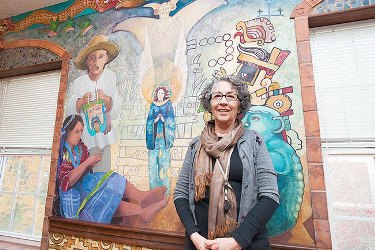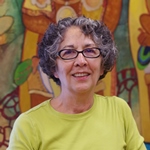Reprinted with permission of the News-Register. Find more News-Register stories about Linfield College here.

Marcus Larson/News-Register
Violeta Ramsay in the Spanish room at Linfield College, where she has taught since 1990. The room features murals depicting her native Mexico.
By Starla Pointer
Of the News-Register
The Chihuahua of Violeta Ramsay’s childhood was not nearly as Americanized as the Chihuahua of today.
The northern Mexican state shares a border with Texas. That proximity, combined with the Internet and sweeping globalization, has led to the fading of many Mexican cultural practices still going strong in southern Mexico.
“The north is too close to the U.S.,” she said. “The U.S. is always rubbing off on it.”
As an example, homemade tamales were a staple at Christmas when she was a girl. Today, instead of investing time preparing the traditional recipe, many Chihuahua residents drive to the grocery store and buy a frozen turkey, exactly as they do in El Paso, just a border crossing away.
Still, in the remote Chihuahua village where she owns a second home, the McMinnville woman finds plenty to remind her of the traditions of her youth.
If she’s there for Christmas, she can join the local women in a house-to-house caroling procession on Dec. 23. More and more singers join as the group continues the procession, representing the journey of Mary and Joseph to seek lodging in Bethlehem.
It’s a wonderful tradition that brings the community together, said Ramsey, who teaches Spanish at Linfield College.
In recent years, though, she has noticed modernization creeping in and displacing tradition, even in rural areas. For instance, professional troupes now visit the village to host dances. The local people enjoy it, she said, but she dislikes the crass commercialism.
“They’re just money makers, not part of the community,” she said. “It’s totally destroyed things.”
Such practices are making the traditional Mexican village more like a town somewhere in the U.S., she said. “Too much emphasis on presents, not enough on family.”
Family was the center of life, and of Christmas traditions, when Ramsay was growing up.
Her family was very traditional, she said, so she and her brother and two sisters looked forward to a big meal on Dec. 24. Tamales stuffed with pork or other meats were a favorite dish.
Sometimes they would have turkey. But it would be one her father had brought home weeks earlier, fattened up for the occasion, then slaughtered.
“That was the only way you’d get turkey in the city back then,” she said.
She said grocery stores in Chihuahua didn’t have freezers full of inexpensive turkey at the time. But today, she said, “They’re everywhere.”
After dinner, they would join other families at the local Catholic church for midnight Mass. Everyone was there that night, whether or not they were overtly religious.
The church would be decorated for the occasion with lights and a nativity scene. Individual homes also displayed smaller versions of the nativity.
Now, however, “Everyone has a Christmas tree,” Ramsay said.
Back then, Christmas Eve was the most sacred part of the holidays. On Christmas Day, people would go visiting.
Friends would open their homes and set out treats — Christmas cookies, hot fruit punch and perhaps tamales left from the previous day’s dinner. Or they would offer toffee peanuts or candied squash, cactus or fruit.
Fruits and vegetables candied in syrup also were used as fillings for sweet tamales, she said.
It was customary to eat something wherever you went, Ramsay said. “You’d be more stuffed that day than the day before,” she said, remembering with a happy groan.
Families would hand out bags of candy, cookies and nuts. It was a Christmas Eve tradition to make 25 to 50 bags of treats to give to poor people and children as well.
As children, Ramsay and her siblings believed in Santa Claus. Then Ramsay, the eldest, realized that their parents were the ones who supplied the dolls and skates.
She told her younger sisters and brothers, then enlisted them in keeping up the pretense that they still believed. “We’d pretend so we’d still get presents,” she explained.
She recalled wishing for a bicycle. Her parents couldn’t afford such an elaborate gift, though.
As time went on, her mother and other housewives began taking jobs outside the home. Families began to have more disposable income.
“Northern Mexico was changing,” she said. Even though the changes meant they could move into a nicer house, she said, they also heralded the loss of many cultural practices.
“I really like all those traditions,” she said. “As we grew up and things changed, they got lost.”
One of her sisters still lives in their hometown. Like Ramsay, her other sister and brother live in the U.S.
Ramsay moved north with her husband when she was in her 20s.
Keith Ramsay is a native of the U.S., but had lived many places, she said. They met when he was in Mexico.
The young couple moved to Eugene, where she started classes at the University of Oregon. She said she loved the atmosphere there, where she was surrounded by students from other countries and traditions.
“So my Christmas there was from all over — Chile, France …” she recalled. “And I had friends who were Jewish, too, so I got to appreciate both Christmas and Hanukkah. I really enjoyed the diverse celebration.”
Today, Ramsay carries on with many of her childhood traditions at Christmastime.
Since she doesn’t include much meat in her diet, she now fills her tamales with green peppers and cheese. Sometimes she makes chicken or turkey with mole sauce, a Southern Mexican tradition passed down by the Aztecs.
Accompanying the main dishes are buñuelos — a fried bread — and punch.
In addition to tamales, she also prepares paella, a Spanish dish featuring rice and a variety of seafood, for Christmas.
“It’s good!” she said. “But it’s a pain to make, so I only do it on special occasions.”
She said moving to the U.S. broadened her repertoire of recipes.
“I learned to make good things in Oregon with greens, root vegetables … and seafood,” she said. “I love the seafood and the wine here.”
Ramsay and her husband recently celebrated their first Thanksgiving with their new daughter-in-law and their son, Odysseus. The couple married earlier this year.
Odysseus, 27, graduated from McMinnville High School, then Linfield. His wife also is a Linfield graduate. They have settled in Hillsboro.
Keith Ramsay cooked the Thanksgiving turkey, as usual. She and her son, and this year his wife as well, did the rest.
As she often does, Ramsay tried some new holiday recipes this year. She likes to experiment with different ways to fix squash or sweet potatoes, twists on cranberry sauce and different desserts.
And of course, she said, “One has to have the pumpkin pie.”


